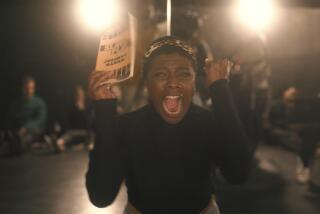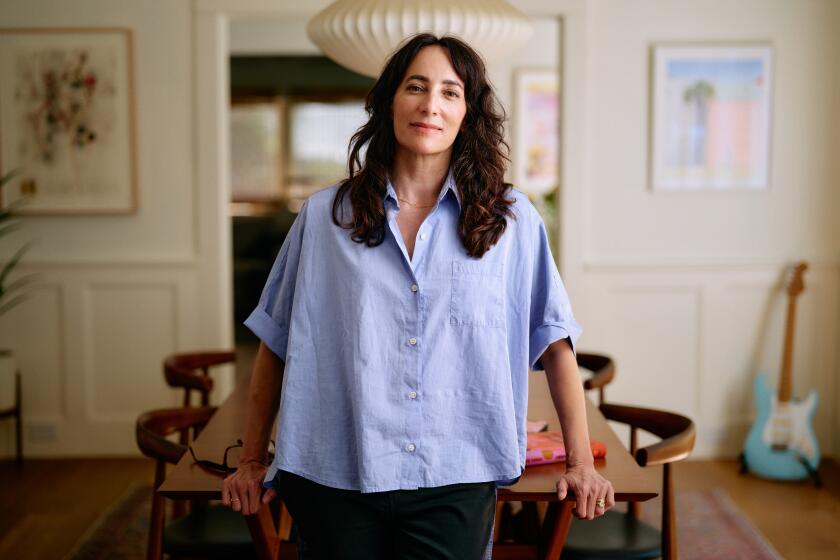Colson Whitehead’s ‘The Underground Railroad’ is timely, necessary and shattering
It’s hard to make your way through the Underground Railroad. And when you finally do — after days, weeks, months submerged in its acrid darkness, soundless and shattered, with only bouts of desperate, fitful sleep — you come up to the light, stand still in the open air and wait for the next instance when you are either violently seized or forced to flee for your life. I am referring both to the story line of “The Underground Railroad” by Colson Whitehead and the experience of reading it. At every point of entry, opening “The Underground Railroad” feels like reentering the actual pages of the book, itself a lightless tunnel, as the narrative digs into your gut, jars you out of complacency, shoots a kind of acid history into your bloodstream and settles into your bones. As it should be.
Whitehead’s latest novel is, in its way, a slave narrative; it follows Cora, a young slave girl, and her escape from the Randall plantation in Georgia after she learns about the Underground Railroad from a newly purchased slave named Caesar. But it is also a fiercely salient reckoning of what it means, has meant and continues to mean to be black in America.
As we readers arrive at the end of our first black presidency, continue to face almost daily viral video footage of police killing black bodies, and black Americans salute — perhaps at our own peril — the awakened political power of young racial justice activists and pop cultural artists, “The Underground Railroad” could not be more timely and necessary.
In America, when it comes to understanding or examining systemic racism, we often hear reference to “the conversation” and how important it is to accept the challenge of how “uncomfortable” that conversation might be. What is so strikingly clear in the pages of “The Underground Railroad” is that we actually have no idea just how uncomfortable we need to get before we even begin to understand how far we have to go.
A fiercely salient reckoning of what it means, has meant and continues to mean to be black in America.
— Rebecca Carroll on ‘The Underground Railroad’
In her video announcing “The Underground Railroad” as the most recent selection for her celebrated book club, Oprah Winfrey says, “Oh, have I found a great book! ... This book has kept me up at night, had my heart in my throat, almost afraid to turn the next page.” And it is a great book — beautifully written, vigorous in its horror and proxy for historical truth — but perhaps more important than Oprah deeming “The Underground Railroad” great is the fact that her book club can function as a fire hose to get its story out to an extensive readership, elite and broad. It’s not the first time Oprah has chosen a book by a black author or one that deals with issues surrounding race in America. It is, however, the most explicit selection that deals with slavery in jarring detail. My hope is that not just a quarter or half of Oprah’s Book Club members read this book and feel moved by it — but that all of Oprah’s Book Club members read this book and feel not merely moved, but galvanized. Not to riot, but to reconcile with the racial narrative this country has contrived to center a white supremacist provenance, and which Whitehead lays bare.
The book begins with the maiden voyage, the well-documented slave ships, the treacherous, inhumane conditions of bodies stacked upon bodies, chained to plank beds, breathing in the stench and existing for weeks and months soaked in urine and feces and sick, being force fed just enough to prevent starvation, brought to the edge of death as punishment for trying to die. Cora’s grandmother Ajarry was on one of these ships — torn away from her African village of Ouidah. The men had been taken first, and Ajarry learns before her own capture that because her father hadn’t been able to keep pace with the others, the slavers “stove in his head and left his body by the trail.” This is Page 1.
We have heard and read these stories throughout history — handed down in our families or taught in college, sometimes in high school. But for many of us now so far physically removed from slavery, it’s hard to imagine enduring the utterly relentless barbarity of the Middle Passage. Or later, life on the plantation, with “travesties so routine and familiar that they were a kind of weather.” It is at the very least intensely harrowing to read, a feeling compounded by a mighty, almost insurmountable sense of gratitude for those who withstood the worst denigration of our origins as black people in America so that we could live. If I can hardly bear to read it, it would be arrogant to think that I have any real sense of what it might actually feel like to experience it.
I had vivid, brutal nightmares every night for the first few days after I started reading the book — always some variation of me and my son being kidnapped and enslaved, my son watching me get raped by a slave master with my neck in a noose, while my husband, who is white, was left to wonder whether we were dead or alive, or if he himself would be murdered for miscegenation -- but I still woke up in the morning unshackled, my son sleeping soundly in the room next door, our family intact.
What is not hard to imagine, though, what in fact feels like a backdated American anthem, is the deafening tenacity of our perceived worthlessness as living, breathing human beings.
Cora makes three trips on the Underground Railroad, which in the book is an actual railroad with tracks, platforms and compartments of varying upkeep or decay, and engineers and conductors that navigate the train through tunnels dug by hand underneath Southern land. Cora’s grandmother had died on the plantation, but her mother, Mabel, had fled and never been caught. Mabel becomes a subject of lore, about which slave masters and slave catchers alike become obsessive. Cora resents her mother for leaving her, but vehemently protects and tends to the tiny garden passed down from her and her grandmother.
Cora both does and doesn’t run because of her mother. Ultimately, the precipitating factor doesn’t entirely matter: “Every slave thinks about it. In the morning and in the afternoon and in the night. Dreaming of it. Every dream a dream of escape even when it didn’t look like it. When it was a dream of new shoes.” We follow Cora and Caesar to South Carolina, where they both make brief and tentative, almost free lives for themselves. Then Cora is forced to flee again and again, all while being hunted down by Ridgeway, a patroller who pursues runaway slaves “as if they were rabbits and then his fists subdued them.… In the chase his blood sang and glowed.”
By the time we get to the end of the book, Cora, who is throughout bold and strange and smart, has been branded, beaten, raped, hunted, shackled, held hostage in an attic for months, and wholly debased. She has also found her own black Elysian Fields — mythic and real, delusional and definitive — where DuBoisian figures lecture, books are plenty, and love is possible. But it doesn’t last, in much the same way that whatever progress we make regarding racial justice and equality today, in 2016, doesn’t last and we are soon reminded that it cannot be. It’s nothing more than a dreamscape.
Other characters are as discerning, clear-eyed and pointed as Cora. “The conflict in Europe was terrible and violent,” one old woman explains to her lover, “but she took issue with the name. The Great War had always been between the white and the black. It always would be.”
Critic at Large Rebecca Carroll on Colson Whitehead’s new novel “The Underground Railroad” (Doubleday: 320 pp., $26.95)
More to Read
Sign up for our Book Club newsletter
Get the latest news, events and more from the Los Angeles Times Book Club, and help us get L.A. reading and talking.
You may occasionally receive promotional content from the Los Angeles Times.








